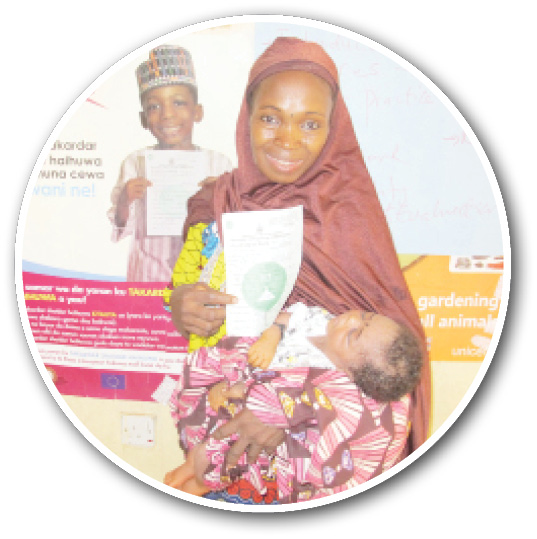Habiba Lawali, advocate of birth registration for every child
Habiba Lawali lives in Alosa, one of the many hard-to-reach communities in Argungu Local Government Area of Kebbi State in northern Nigeria. She is one of beneficiaries of the antenatal care provided at a UNICEF Nigeria supported health facility in her village. During the scheduled visits, Habiba receives information about healthy practices for mothers and […]

Habiba Lawali lives in Alosa, one of the many hard-to-reach communities in Argungu Local Government Area of Kebbi State in northern Nigeria. She is one of beneficiaries of the antenatal care provided at a UNICEF Nigeria supported health facility in her village.
During the scheduled visits, Habiba receives information about healthy practices for mothers and their newborns. She first learned about exclusive breastfeeding during her prenatal visits, which she has adhered to since the birth of her four months old daughter, Rabiyatu.
Habiba is happy to go to the health facility for routine immunisation for her daughter. During one of those visits, she requested for a birth certificate for the baby.
“Our village head always advised us to ask for a birth certificate, so I demanded for it and my child was given (the certificate),” said Habiba.
The issuance of a birth certificate to her daughter did not cost any money.
The village head, Alhaji Muhammad Abubakar (Magajin Alwasa) often takes time off his regular activities to supervise the vaccination and other interventions for children during routine immunization days at Alwasa Primary Health Care.
Hamida Abubakar, a community health and extension worker, presented Habiba with the birth certificate of her baby girl, Rabiyatu. She commended Habiba for her doggedness in attending her regular antenatal care and the immunization for her child.
“Her daughter has been vaccinated for VCG, HB, and OPV and issued with a birth certificate,” said Hamida, who has issued over 200 birth certificates between January and May this 2019.
Birth certificate is one of the most critical gifts parents can give to their newborn. Articles 7 and 8 of the Convention of the Rights of the Child provides that every child has the right to have their birth legally registered and to have a nationality and every child also has the right to know his or her parents and, as far as possible, to be cared for by them.
Habiba has pledged to voluntarily continue to create awareness about the importance of birth registration and birth certificates amongst her peers in the community to ensure that they also receive birth certificate for their newborn to help secure a good and a sustainable future for every child.
“I am happy my daughter has been immunized and issued a birth certificate and would be more than happy to see other mothers have one for their children,” she said.
Through funding from the European Union, UNICEF has successfully facilitated the combined efforts of health workers, traditional and community leaders, volunteer community mobilizers and some women advocates in Kebbi State to promote maternal, newborn and child health. Between 2016 and present, over 800,000 children under the age of five have obtained their birth certificates from the National Population Commission, the legal authority for the issuance of child birth certificates in Nigeria.
UNICEF Nigeria is also working with the National Population Commission to ensure that every child under the age of five in Nigeria receives a birth certificate. In Kebbi State, there is a deliberate effort to reach the underserved communities with healthcare services, including the issuance of birth certificate.
“I am grateful to our leaders, health workers, UNICEF and the European Union for helping us access healthcare services with minimum difficulties because reaching our community requires extra commitment so we are grateful for this support,” Habiba said.
